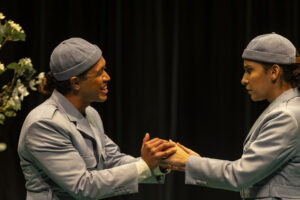The Playhouse, October 26
8/10

At the end of Twelfth Night, the “most notoriously abused” Malvolio says to the rest, “I’ll be revenged on the pack of you.” Director Heather Fairbairn’s take on the character is so different to your run-of-the-mill Malvolios that you rather wish Shakespeare had written a sequel, and we could see that revenge play out. It would be the tragedy that the wildly funny Twelfth Night sometimes longs to be.
The first thing setting Fairbairn’s Malvolio apart is that she is now Malvolia, robustly played by Jane Mongomery Griffiths. Not only is the scene where she’s tricked into dressing grotesquely to appeal to (her mistress) Olivia as riotous as it should be, but we see her silently emerge from the dark place in which she has been imprisoned by her triumvirate of tormentors, and collapse in such complete pathos as wins our hearts.
This is something no Malvolio usually does, because we are too amused by his tormentors to care much, other than to think they might have stretched their practical joke a trifle far. Yet feeling this sympathy fits like a “chev’ril glove” with another aspect of Fairbairn’s production: having the music for Feste the Fool’s songs composed by Sarah Blasko. With her typical wistfulness, Blasko emphasises the minor key that inherently underscores this most nuanced of comedies, in which the belly laughs occur against a backdrop of all except Feste and Maria being desperate for bonded love, even as they shoot themselves in their collective feet in their efforts to attain this. “I was adored once, too,” fibs Sir Andrew Aguecheek (Mike Howlett) forlornly, and no one wants that adoration to be a purely past-tense phenomenon.

Fairbairn has the alarmingly talented Tomas Kantor play Feste – usually Twelfth Night’s most rational character – like some refugee from The Rocky Horror Show, while singing the songs in a voice akin to Blasko’s own, and being a ringmaster for this circus of zanies. Malvolia apart, the zaniest of all are two of her tormentors, Sir Toby Belch (Keith Agius) and Sir Andrew (Mike Howlett), whipped up by the feisty, decidedly brighter – if curiously sadistic – Maria (Amy Hack). These three actors share such presence and comedic skills that you always relish their return to the action. It is not until they eavesdrop on the soliloquizing Malvolia (Act II, Scene 5) that the show really takes off (despite having been touring for three months) in a way that hoists it above Bell Shakespeare productions of recent years, with Griffiths central to that transformation.

Fairbairn’s other twist is to toy with gender even more than Shakespeare’s routine of having a male actor play a female (Viola), pretending to be a male (Cesario). Here Viola is initially performed by Isabel Burton, but once she dons her Cesario disguise she’s affably portrayed by Alfie Gledhill, and Burton subsequently becomes her twin brother, Sebastian, with implications for the later romances with Olivia (Ursula Mills) and Orsino (Gareth Holcombe). Chrissie Mae completes the cast as Antonio.
Mills struggles to find a tone for Olivia that’s not too false, even in a play in which falseness rules supreme, and there are other clunks and grinds in the acting, but much more often, from Malvolia’s soliloquizing point onwards, the production delights. Charles Davis’s set readily allows Fairbairn to set the racy pace the play demands, and his costume design furiously compounds the amusement in the notorious “cross-gartered” scene. As Sebastian asks at one point, “Are all these people mad?” Yes, all except for the Fool.
Until November 19.
https://www.bellshakespeare.com.au/twelfth-night
https://www.sydneyoperahouse.com/bell-shakespeare/2023-season/twelfth-night